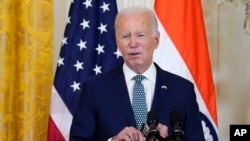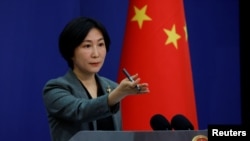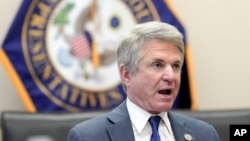President Joe Biden on Thursday doubled down on comments he made earlier this week likening Chinese President Xi Jinping to a dictator.
Asked about the comments during a joint press conference with Indian Prime Minister Narendra Modi at the White House, Biden said his blunt statements regarding China were “just not something I’m going to change very much.”
He made another indirect criticism of the Chinese system of government, saying that a fundamental reason he believes the U.S.-China relationship is not in the same place as the U.S.-India relationship "is that there’s an overwhelming respect for each other because we're both democracies.”
He downplayed the impact of his words on already tense U.S.-China ties and said he still expected to meet with Xi soon.
On Wednesday, a senior administration official said in a statement sent to VOA, “It should come as no surprise that the president speaks candidly about China and the differences that we have. We are certainly not alone in that.”
At a California fundraiser for his 2024 presidential campaign on Tuesday, Biden said Xi was taken by surprise when a suspected Chinese spy balloon drifted across the continental United States before the U.S. military shot it down in February.
“That’s what’s a great embarrassment for dictators, when they didn’t know what happened,” Biden said. “When it got shot down, he was very embarrassed. He denied it was even there.”
Biden’s “splashy designation of Xi as a dictator” just days prior to extending the honor of an official state visit to Modi was well-timed, said Michael Butler, associate professor of political science at Clark University.
While the Modi visit is “clearly indicative of the Biden administration’s grand strategy to court India as a counterweight to China,” the president’s remark can be seen “both as an attempt to highlight Indian democracy as well as, more cynically, to soft-pedal Modi's prominent assaults on it,” Butler said.
China responds
China’s Foreign Ministry hit back at the dictator remark, saying Biden’s comment had “seriously violated China’s political dignity and amounted to public political provocation.”
“The relevant remarks by the U.S. side are extremely ridiculous and irresponsible. They seriously violate basic facts, diplomatic protocol and China's political dignity,” Foreign Ministry spokeswoman Mao Ning said at her Wednesday briefing. "China is strongly dissatisfied with and firmly opposed to this."
The press is usually forbidden from recording a U.S. president’s fundraising events, but the White House provided a transcript of Biden’s remarks.
The comments were especially notable as they were made a day after Secretary of State Antony Blinken visited Beijing to try to repair bilateral relations that have hit a historic low. Washington postponed Blinken’s visit, originally scheduled for February, after the balloon was destroyed.
While Blinken’s visit failed to produce any major breakthrough, he and Xi agreed to stabilize the U.S.-China rivalry so it does not veer into conflict.
The State Department rejected the notion that Biden’s comments were counterproductive to his top diplomat’s efforts.
“We will continue to responsibly manage this relationship, maintain open lines of communication with the PRC, but that, of course, does not mean we will not be blunt and forthright about our differences,” department spokesperson Vedant Patel said in his briefing Wednesday.
“We have been very clear about the areas in which we disagree, including the clear differences we see when it comes to democracies and autocracies,” he added.
Biden’s comments brought renewed focus on the balloon incident that administration officials have sought to put behind them since the president signaled a thaw in relations in May, following a meeting between White House national security adviser Jake Sullivan and top Communist Party diplomat Wang Yi.
Domestic pressure
Biden is facing domestic pressure from Republicans in Congress who have sought to portray his administration as weak on China and have characterized efforts to mend ties with Beijing as tantamount to appeasement.
“The Biden administration is holding back U.S. national security actions to chase fruitless talks with the CCP,” Representative Michael McCaul, Republican chairman of the House Foreign Relations Committee, said in a statement, referring to the Chinese Communist Party.
Last week a group of Republican senators sent a letter to Biden urging a public accounting of his administration’s assessment of the suspected spy balloon and expressing frustration with its “failure to confront China’s brazen threats to America’s security and sovereignty.”
“Republicans won't let it go because it provides them with extra ammunition,” said Michael Swaine, a senior research fellow at the Quincy Institute for Responsible Statecraft. “You’ve got sniping going on in the party, people in Congress who think they know better about how to manage the relationship, when they don't,” he told VOA.
Rising tensions
The bitter rhetoric shows how challenging it is to bring down tensions and jump-start communications between the two rivals.
"If the engagements we're seeing are then followed by such direct criticisms from very senior officials, I think the Chinese side is going to ask what the point of the engagement is in the first place,” said Zack Cooper, a senior fellow at the American Enterprise Institute.
“I do think there's going to be probably some pretty difficult conversations between Beijing and Washington over the next few days and the next few weeks,” Cooper told VOA.
Moscow also condemned Biden's comments. On Wednesday, the Kremlin said the comments reflected the U.S. administration’s “unpredictable” foreign policy.
"This is a very contradictory manifestation of U.S. foreign policy, which points to a significant element of unpredictability," spokesman Dmitry Peskov said.






